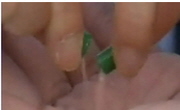Purpose: To explore the effects of roasting on the antioxidant and whitening activities of Achyranthes bidentata root extracts, targeting the changes in bioactive compounds. Methods: A. bidentata roots were roasted at 150°C and 200°C for 10, 20, and...
http://chineseinput.net/에서 pinyin(병음)방식으로 중국어를 변환할 수 있습니다.
변환된 중국어를 복사하여 사용하시면 됩니다.
- 中文 을 입력하시려면 zhongwen을 입력하시고 space를누르시면됩니다.
- 北京 을 입력하시려면 beijing을 입력하시고 space를 누르시면 됩니다.

로스팅 공정에 의해 향상된 우슬 뿌리 추출물의 항산화 및 미백 효과 = Roasting-Induced Enhancement of Antioxidant and Whitening Effects in Achyranthes bidentata Root Extracts
한글로보기https://www.riss.kr/link?id=A109620509
- 저자
- 발행기관
- 학술지명
- 권호사항
-
발행연도
2025
-
작성언어
Korean
-
주제어
Achyranthes bidentata ; Roasting ; Antioxidant ; Whitening ; Natural products ; 우슬뿌리 ; 로스팅 ; 항산화 ; 미백 ; 천연물 ; 牛膝,烘焙,抗氧化,美白,天然产品
-
등재정보
KCI등재
-
자료형태
학술저널
-
수록면
57-70(14쪽)
- 제공처
-
0
상세조회 -
0
다운로드
부가정보
다국어 초록 (Multilingual Abstract)
Purpose: To explore the effects of roasting on the antioxidant and whitening activities of Achyranthes bidentata root extracts, targeting the changes in bioactive compounds. Methods: A. bidentata roots were roasted at 150°C and 200°C for 10, 20, and 30 min, followed by hot water extraction. The antioxidant activities (DPPH and ABTS radical scavenging), total polyphenol and flavonoid contents, and tyrosinase inhibition activities were evaluated. Chemical changes were assessed using UV-Vis, FT-IR, and HPLC-UV spectroscopy. Results: Roasting significantly enhanced the DPPH and ABTS radical scavenging activities, with the highest antioxidant activity recorded at 200°C for 30 min (13.54 and 16.18 mg AAE/g, respectively). The total polyphenol and flavonoid contents also increased markedly, from 1.35 mg GAE/g to 4.89 mg GAE/g and from 0.054 mg QE/g to 1.276 mg QE/g, respectively. Tyrosinase inhibition, initially negligible in unroasted extracts, showed a substantial increase after roasting, with the highest inhibition observed at 200°C for 30 minutes. Correlation and principal component analyses revealed strong positive relationships between the roasting conditions and bioactive compound levels. Additionally, UV-Vis spectroscopy identified increased absorption peaks related to polyphenols and melanoidin, whereas FT-IR and HPLC-UV fingerprint analyses confirmed significant chemical changes and formation of new compounds due to roasting. Conclusion: The study results demonstrated that the roasting process contributes to enhancing the antioxidant and whitening activities of A. bidentata root extracts, providing valuable foundational data for future studies on optimizing the roasting process to strengthen the bioactivity of natural materials, such as the A. bidentata roots.
동일학술지(권/호) 다른 논문
-
- 한국피부과학연구원
- 정재은
- 2025
- KCI등재
-
성인의 심리적 요인에 미친 로즈 에센셜 오일과 다마스크 로즈 에센셜 오일 연구에 대한 메타비교분석: 불안, 우울 및 스트레스를 중심으로
- 한국피부과학연구원
- 유미나
- 2025
- KCI등재
-
Derma GenieTM 및 Elixir StoneTM을 함유한 패치 제품의 종아리 붓기 감소, 혈행 개선, 피부 온도(온열) 상승에 대한 인체효능평가 연구
- 한국피부과학연구원
- 유보
- 2025
- KCI등재
-
- 한국피부과학연구원
- 유보
- 2025
- KCI등재




 KCI
KCI eArticle
eArticle






